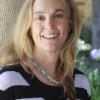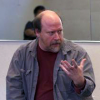 Doree Allenis a Senior Lecturer and the founding director of Stanford’s Oral Communication Program. She earned a B.A. in English from Mills College, and went on to receive her M.A. in Film and her Ph.D. in English from Stanford University,
Doree Allenis a Senior Lecturer and the founding director of Stanford’s Oral Communication Program. She earned a B.A. in English from Mills College, and went on to receive her M.A. in Film and her Ph.D. in English from Stanford University,
In addition to offering individual consultations to students and faculty throughout the university, she teaches a variety of courses and workshops on public speaking and oral interpretation, including The Art of Public Speaking, From the Page to the Stage, Leading Out Loud, and The TED Commandments. Her research interests include the poetics of the performed text and Carol Gilligan and Kristin Linklater's innovative work on voice and gender. Currently, she is developing a project that involves the writing and performance of poetry in museum and gallery settings. She can be found most weekends hiking the coastal trails of West Marin.
 Thomas FreelanDis a lecturer in the Oral Communication Program, leading workshops and providing individual coaching in vocal technique, public speaking and interview preparation. He has a Ph.D. in Drama from Stanford, and has both directed and appeared in many local stage productions. He also teaches CTL 115: Voice Workshop, CTL 219: Public Speaking for Graduate Students, and CTL 177: The Performance of Power (which satisfies the WR-2 requirement).
Thomas FreelanDis a lecturer in the Oral Communication Program, leading workshops and providing individual coaching in vocal technique, public speaking and interview preparation. He has a Ph.D. in Drama from Stanford, and has both directed and appeared in many local stage productions. He also teaches CTL 115: Voice Workshop, CTL 219: Public Speaking for Graduate Students, and CTL 177: The Performance of Power (which satisfies the WR-2 requirement).

Alya Raphaelis a lecturer in the Oral Communication Program, as part of the Hume Center for Writing and Speaking. She received her Ph.D. from Stanford University in Developmental Biology and conducted postdoctoral training at the University of Pennsylvania and Stanford University in Cell Biology and Genetics. Throughout, she has maintained a strong love for teaching and tutoring, working as a tutor in the Oral Communication Program at Stanford and serving as a Visiting Assistant Professor at Haverford College. Coming to OCP and the Hume Center from a scientific background, Alya particularly enjoys working with students and researchers to help them find their voices and learn how to speak about complex topics to a wide variety of audiences.



